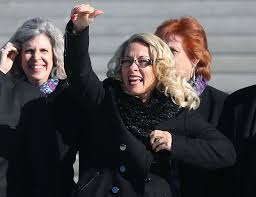Supreme Court agrees to hear First Amendment Case: A Victory would end Public Employee Unions’ Monopoly Power
Press Release 09/28/2017
“We are happy to announce that the U.S. Supreme Court today agreed to hear a case over union fees that, if successful, will restore the First Amendment rights of public employees in Minnesota and the nation “said Kim Crockett, Vice President and General Counsel at Center of the American Experiment. “This case also has the potential to dramatically reshape and reduce the political influence of powerful public employee unions like Education Minnesota, particularly in non-right-to-work states like Minnesota.”
The case involves child support specialist Mark Janus, who’s asking the court to overturn a landmark 1977 decision that forces public employees to pay their so-called “fair share” of collective bargaining costs as a condition of employment.[1] Under state law, fair share dues are set by the union; in Minnesota, they are about 85 percent of full dues.
 “I brought this case on behalf of all government employees who also wanted to serve their community or their state without having to pay a union first,” Janus said.
“I brought this case on behalf of all government employees who also wanted to serve their community or their state without having to pay a union first,” Janus said.
If Janus wins, unionized public employees in non-right-to-work states like Illinois and Minnesota will be able to keep their jobs, even if they do not join or financially support the union. A decision in favor of Mr. Janus would not affect the status of certified bargaining units or the right to collectively bargain.
The result could be a significant decrease in public employee union membership, millions of dollars less revenue from dues and fees and further erosion of organized labor’s political clout at the state and national level.
In fact, public employee unions in Minnesota were bracing for the financial and political impact well before the Supreme Court officially today took up the case.
Center of the American Experiment recently reported that Education Minnesota and the Minnesota Association of Professional Employees (MAPE) have already begun taking steps in anticipation of the impact on their membership rolls and revenue in the event of an expected adverse decision by the high court.
Education Minnesota plans to press all 86,000 teachers to sign a form that automatically renews payment of union fees every year unless the teacher remembers to opt out in writing. In addition, teachers’ annual dues—now roughly $600 to $800—will increase $14 a year in anticipation of the fallout from the Janus case, according to a teacher who contacted Kim Crockett at American Experiment.
” It is widely believed the court will side with Janus, a ruling that would prohibit Education Minnesota and other public-sector unions from collecting fair-share fees,” Christina Ogata, general counsel for Education Minnesota states online. “If this happens, Education Minnesota will be required to continue representing its 6,000 fair-share feepayers but will not be allowed to assess any fee for doing so.”
Under Minnesota labor law, public unions are the “exclusive representative” for all employees in that bargaining unit regardless of membership in the union. According to Crockett, “Decades ago when labor laws were passed, public unions demanded that exclusive status. They may wish to revisit that bargain if Mr. Janus wins.”
MAPE will cut the union’s budget more than 20 percent next year to offset the anticipated loss of members and revenue after the Janus decision expected in June 2018.
“This budget was based on unions’ experiences in right-to-work states where membership declines and fair share fees are no longer being collected,” MAPE Statewide Treasurer Michelle Doheny said in a July 26 letter to union members and fee payers.
 This marks the second time the high court has revisited the Abood decision in recent years. A California schoolteacher named Rebecca Friedrichs (pictured here on the steps of the U.S. Supreme Court, photo from LA Times) sued the teachers’ union on the same constitutional grounds as Mark Janus in a case argued in January 2016.
This marks the second time the high court has revisited the Abood decision in recent years. A California schoolteacher named Rebecca Friedrichs (pictured here on the steps of the U.S. Supreme Court, photo from LA Times) sued the teachers’ union on the same constitutional grounds as Mark Janus in a case argued in January 2016.
Both Janus and Friedrichs argued that since collective-bargaining is inherently political, forcing public employees to fund so-called “representational activities” of the union violates their First Amendment rights.
Seasoned Supreme Court observers, including government unions, believed Friedrichs would prevail in a 5-4 decision. But before the Court could issue a written opinion, Justice Scalia died.
[1] Janus v. American Federation of State, County, and Municipal Employees, Council 3. Issues: (1) Whether Abood v. Detroit Board of Education should be overruled and public-sector “agency shop” arrangements invalidated under the First Amendment; and (2) whether it violates the First Amendment to require that public employees affirmatively object to subsidizing nonchargeable speech by public-sector unions, rather than requiring that employees affirmatively consent to subsidizing such speech. (SCOTUSblog)